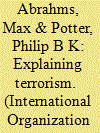| Srl | Item |
| 1 |
ID:
139798


|
|
|
|
|
| Summary/Abstract |
Certain types of militant groups—those suffering from leadership deficits—are more likely to attack civilians. Their leadership deficits exacerbate the principal-agent problem between leaders and foot soldiers, who have stronger incentives to harm civilians. We establish the validity of this proposition with a tripartite research strategy that balances generalizability and identification. First, we demonstrate in a sample of militant organizations operating in the Middle East and North Africa that those lacking centralized leadership are prone to targeting civilians. Second, we show that when the leaderships of militant groups are degraded from drone strikes in the Afghanistan-Pakistan tribal regions, the selectivity of organizational violence plummets. Third, we elucidate the mechanism with a detailed case study of the al-Aqsa Martyrs Brigade, a Palestinian group that turned to terrorism during the Second Intifada because pressure on leadership allowed low-level members to act on their preexisting incentives to attack civilians. These findings indicate that a lack of principal control is an important, underappreciated cause of militant group violence against civilians.
|
|
|
|
|
|
|
|
|
|
|
|
|
|
|
|
| 2 |
ID:
165160


|
|
|
|
|
| Summary/Abstract |
Are UN peacekeepers effective in protecting civilians from violence? Existing studies examine this issue at the country level, thereby making it difficult to isolate the effect of peacekeepers and to assess the actual mechanism at work. We provide the first comprehensive evaluation of UN peacekeeping success in protecting civilians at the subnational level. We argue that peacekeepers through their sizable local presence can increase the political and military costs for warring actors to engage in civilian targeting. Since peacekeepers’ access to civilian populations rests on government consent, peacekeepers will primarily be effective in imposing these costs on rebel groups, but less so for government actors. To test these conjectures we combine new monthly data on the location of peacekeepers with data on the location and timing of civilian killings in Africa. Our findings suggest that local peacekeeping presence enhances the effectiveness of civilian protection against rebel abuse, but that UN peacekeeping struggles to protect civilians from government forces.
|
|
|
|
|
|
|
|
|
|
|
|
|
|
|
|